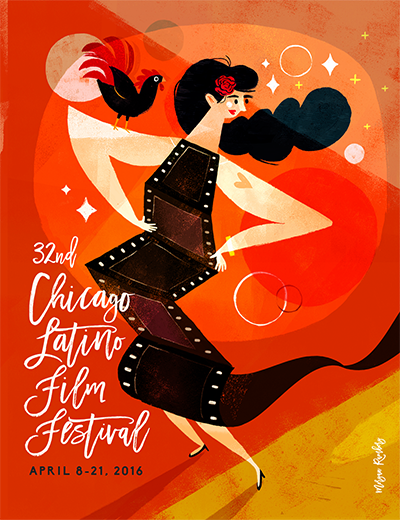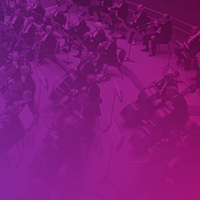Unless you are a movie buff, there is no point calling George Diaz with social plans during a two-week period in each spring. His free time during those 14 days is spent on one thing: going to the International Latino Cultural Center’s Chicago Latino Film Festival.
Diaz is one of tens of thousands of people – Latino and non-Latino alike – from throughout Chicago who attend what has become one of the premiere Latino film festivals in the country. Festival attendees visit countries around the world through film, learn about different cultures, politics, and traditions and the human experience.

“It probably is the most important Latino film festivals in the country,” said Diaz, a former board member for the International Latino Cultural Center (ILCC). “There are many jewels, really good insightful filmmaking from people who probably would not be exposed to the American market were it not for the Chicago Latino Film Festival.”
In its 33rd year, the film festival is the marquee event organized by the International Latino Cultural Center, a non-profit organization founded to promote all Latino cultures. Its founder and executive director is a soft-spoken, unpretentious man, Pepe Vargas, who was born in Colombia, earned a law degree in Argentina and eventually settled in the United States more than three decades ago.
The dedication of Vargas and his small, hard-working staff to promote film, dance, comedy, music and visual arts from Latin America, Portugal, Spain and the United States, has enriched the cultural fabric of the Chicago metropolitan area where nearly two million Latinos now live.
...what better thing than using our culture as a weapon of enlightening and creating awareness and educating and letting people know who we are.
“The work that they do with the limited resources they have truly has impacted our community and the city at large and the surrounding suburbs,” Diaz said.
Making an impact and educating people about Latino culture are the driving forces behind Vargas’ decision to found the ILCC. When Vargas first settled in Chicago and worked at a restaurant while writing for a Spanish-language newspaper, he says that his bosses treated him like a nobody until one of his articles appeared in the Chicago Sun-Times.
The experience motivated Vargas to educate people about all Latino cultures so people appreciate Latinos and recognize their talent.
“We have to do something and what better thing than using our culture as a weapon of enlightening and creating awareness and educating and letting people know who we are,” he said. “People who get in touch with our culture will not only accept us but also in the end admire us.”

The organization began with the Chicago Latino Film Festival, which started in 1985 with 14 films and about 500 attendees who came to watch movies that were projected on a wall at St. Augustine College. This past year, there were 122 films that drew about 40,000 viewers to five AMC theaters, which screened films over the course of two weeks, Vargas said.
Michael Foster started attending the festival after he began working with the ILCC to book hotel rooms for filmmakers and producers who come to the festival. Though he is not Latino, Foster quickly realized from the films that there is a commonality among people that transcends all cultures.
“It’s such a melting pot,” said Foster, a senior sales manager for the Whitehall Hotel. “When you go to those events, you see everybody come together and everybody has a story. You see Afro-Latinos mingling with people who are African American who might say, ‘Oh, it’s the same kind of story.’”
“It’s telling everybody’s stories,” he added.
We are unified under one common language, but at the same time we are culturally different from the various regions we come from.
At the same time, viewers gain a greater understanding about the differences within Latino culture, both from the films and the conversations with the artists afterwards, said Myrna Salazar, a former board president of the ILCC who is now working with Vargas on an initiative to launch an international Latino theater festival.
“We are unified under one common language, but at the same time we are culturally different from the various regions we come from,” said Salazar who was born in Puerto Rico.
The film festival’s popularity inspired the ILCC to begin a summer movie program, showing films in a handful of city parks. In doing so, it made high quality art accessible to all people, said Carlos Tortolero, president and founder of the National Museum of Mexican Art.
“A lot of the arts is really beyond people’s means now,” he said. “People are trying to put meals on the table, pay college tuition and pay the mortgage. Films in the park, there’s a communion of human beings coming together and being together and enjoying something in unison. People from different backgrounds. They should be applauded for this.”
In 2006, the ILCC decided to launch the Latino Music Festival, promoting Latino artists and music from as many countries as possible.

It also branched into music, theater, comedy and dance, bringing in ballets from Guatemala and Colombia. While Vargas’ dream is to build a cultural complex in downtown Chicago, for now the ILCC holds performances and events in galleries, museums and theaters.
The ILCC also is expanding its reach into other countries. Gustavo Leone, the co-artistic director of the music festival, added a new twist this year with an international cultural exchange that took a Chicago-based quartet to Bogota, Colombia and brought a Colombian quartet to Chicago. In addition to performing, the musicians coached students, taught classes, and read compositions.
Choosing quality films and performers can be a challenge, especially with limited resources. But Vargas said the rigorous selection process is key to ensuring the ILCC offers top-notch programming.
I believe that sharing our culture and learning from each other’s experiences helps in the understanding and opens up the communication, and I think it is definitely needed.
“We are deeply committed to make sure that things are done and done well because we speak on behalf of a community and our community is big and diverse,” Vargas said.
As Vargas sees it, the more people who learn about Latino culture, the more they will put aside stereotypes and treat others equally.
Indeed, the ILCC’s work adds to the understanding of the rich tapestry of people that make up Chicago, Salazar said.
“There’s always been a lot of indifference when we don’t understand the culture,” she said. “It’s all about race relations and understanding. Culture drives understanding. …I believe that sharing our culture and learning from each other’s experiences helps in the understanding and opens up the communication, and I think it is definitely needed.”
Since 1989, MacArthur has provided $632,000 to the International Latino Cultural Center of Chicago in direct support and in partnership with the Prince Charitable Trusts.



